December 2000
by Betty Ponder
One of the joys of growing older is the possibility of traveling to foreign lands with the Elderhostel. Fifty-five-plus is the age of admittance though younger travelers may be accommodated if accompanied by a member. The academic programs are developed with educators from various Universities and specialists in specific fields. Lectures and field trips are designed to form a dynamic link between presented material, discussion, and the realities encountered en route.
We began with two overnight flights, back to back. The ten hours between flights in dreary rain soaked London was well spent at a day hotel asleep under blankets. So on we went to land in the sun of Nairobi where the grass was green and the earth flower-pot red. The city palmed a few skyscrapers that stretched to finger white puffy clouds hung in blue. The air in Nairobi at 5500 feet was layered sweet and warm, a pleasant contrast to the snapping cold we had just left in Canada.
First impressions of this city of two million was one of bustle mixed with lassitude, many men standing about with their hands in their pockets, street hawkers selling roses and foreign model cars weaving bumper to bumper through British type 'roundabouts', a mix of poverty and beauty. This couple of days in the city gave us a chance to become acquainted with our fellow travelers which consisted of a cross section of ages from the thirties to the eighties therefore we had the exuberance of youth to offset the single mindedness of the aged. Most of us, somewhere in between, were just plain curious. It soon became apparent that our guide, Victoria, was a competent coordinator of this tightly structured Elderhostel program and that the program would be intense since it was obvious there was much to squeeze into too short a time. She was one of the newly emancipated Kenyans, well educated with a Masters degree in political science, and by the end of the trip we were convinced that she was a walking encyclopaedia. She was well versed in botanical and ornithological curiosities, and was an authority on cultural and political customs. She was delightful and ran a no-nonsense ship.
Our Nairobi accommodation was at the Landmark Hotel with outbuildings and multicoloured bougainvillea-shaded inner courtyards sheltering a sun be-speckled pool. It was here that we had our first lecture concerning Kenya's history, economy and culture, a sort of overview delivered by a Professor Tom Wolf, an American who fell in love with Kenya as a young man while working for the Peace Corp and subsequently has been involved in the American Foreign Aid program for that country. He spared no punches in expounding on the corruption of the political system and most of us expected that one of President Moi's troops would drill him in the back, probably through our lecture room window. However we were later assured that present-day freedom of expression is one of the few hopes that is slowly appearing in the country.
We learned that President Moi has been in power for twenty two years following the fifteen year presidency of Jomo Kenyatta who was Kenya's first president after Britain granted the country independence in 1963. During this time Moi was leader of the Opposition, and was also supported by the British who thought Kenyatta to be too radical. He comes from an impoverished tribe in the Rift valley and at one time appealed to the many of the countries forty-two tribes. His rule however has been brutal using many henchmen to perpetrate his dark deeds. This means that many of his henchmen are loath to see him lose power. So on it goes. His picture was featured prominently over the desk in all the hotels that we visited lest we forget where the power lay. Apparently some stability might be forthcoming if the Constitution can be reformed so that Moi's people have a chance to run the government after he releases power or dies. We also learned that Kenya is not one of the countries to which the UN has granted debt relief because of suspected human rights abuses. Only thirty percent of the country is arable through rainfed farming and this includes the White Highlands which is held in general by colonialists. Many of the white colonialists who remained after Independence in 1963 are now selling their lands to those with money, often ill-gotten money from a political system fueled by graft. Forty percent of the money collected by government goes to pay the national debt and forty percent disappears into unrecognized coffers, which leaves twenty percent to be spent in a way that might benefit the populous.
The next afternoon we were off to a tea plantation owned by a third generation Kenyan family named Mitchell, and a beautiful white haired couple they were. They served us tea with proper British cakes and ceremony. The attending blacks knew their jobs well. The home was spare with a kind of small-paned and parquet-floored elegance. The gardens that had been planted by the grandfather were lush and brilliant and the green tea fields roll off into the distance, knee high without discernable paths. Tea is harvested on a continuing basis; the top two leaves and bud only are removed. These are crushed and fermented to make black tea. Women pick. The worker's living accommodation appeared abbreviated though sometimes schools are started by colonialists for worker's children. We visited a small stone church also built by grandfather Mitchell with flying buttresses and arched gardens and low walled graves planted with greenery. It was built to accommodate the local black workers as well as white plantation owners. Louis Leakey is buried here in the well-tended graveyard but nary a black grave is to be found. Victoria says that the Kikuyu take bodies back to the homeland where they are rubbed with oil and given to the animals of the forest, the soul having long departed. The Kikuyu believe in the transmigration of souls and as in most tribes, children are named after dead relatives. Various tribal methods are used to determine which soul has inhabited the child.
White colonialists from Britain and Boors from South Africa began settling the area known as the White Highlands at the turn of the century when Kenya became an official British Colony under the Colonial office. Large waves of immigrants were given land after the World Wars as a reward for fighting on the right side but Blacks who had also done battle were not. This injustice contributed to the Mau Mau uprisings of the early 1950s. In 1960 the British bought one million acres when they saw that independence was inevitable. This they subdivided among the Africans and in 1963 Kenya was given its independence. At this time many whites sold their lands to the government. The Mitchell's indicated that they too would not be able to hold on for another generation.
The next day found us on the bus again. After a three-hour ride we arrived at the Ark, a mountain lodge located in Aberdare National Park that is administered by the Federal Government. The Ark as suggested by its name, is ark-like in shape with many floors with balconies for the viewing of animals and birds. It has been strategically situated adjacent to a salt lick and puddle-pond for the water-play of elephants. Gates to the lodge were snapped shut after our arrival and we are cautioned not to use flash cameras nor speak in voices louder then a whisper, furthermore buzzers in our rooms would be sounded during the night to summon us should interesting animals make an appearance. True to promise, cape buffalo, impala and large herds of elephants came to drink, frolic and ingest salt. The elephants took turns sitting on a particular large rock to scratch their bums and they were very choosy as to which individuals were admitted into which groups. Their social structure that was managed by the largest female seemed complex. A few loners appeared to be ostracized from the herd. Babies were protected by their placement well inside the periphery of the parental groups. We continued to watch this remarkable gathering as dusk fell and jungle sounds changed to night calls.
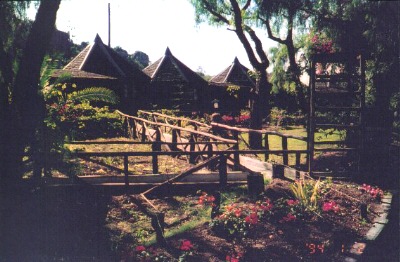 The next day we journeyed on to Nakuru National Park. On the way we crossed the equator with a stop to view the Rift valley. Broad and patch-worked it stretches deep and far into the distance. It's a sight to see from a space craft they tell me stretching from the Jordan Valley to the Red Sea. They also tell me that at the equator the Coriolis affect of water spiraling down a drain can be manipulated in either direction with a nudge of the finger.
The next day we journeyed on to Nakuru National Park. On the way we crossed the equator with a stop to view the Rift valley. Broad and patch-worked it stretches deep and far into the distance. It's a sight to see from a space craft they tell me stretching from the Jordan Valley to the Red Sea. They also tell me that at the equator the Coriolis affect of water spiraling down a drain can be manipulated in either direction with a nudge of the finger.
Nakuru Lodge is made up of small cabins surrounding a large flowered court yard, the gardens carefully tended and paths lit at night when one wandered to the main stone dining room and meeting halls. Here we have our first lesson in Swahili. This is a unifying language developed by traders, which is taught in schools since there are forty-two different tribal languages spoken in the homes. Many children also speak English that they have picked up from visitors. Most Kenyans have an English first name. This reflects a certain missionary influence.
The lecture this day was delivered by a Professor Ngumbi and was intended to give an African version of political events. Accordingly we find that the British cabbaged the best lands in the highlands and ousted any blacks living there though there were few at the time, permitting them access only if employed by a white, nor were the blacks allowed to grow cash crops. In 1940 the first political party was formed and from that time the constitution has undergone several metamorphoses, one party, two party, Mau Mau uprising and Independence etc. In 1982 parliament moved that the country adopt a one party system by constitution. This resulted in the West's view that Kenya was an undemocratic country so no aid was forthcoming. In 1991 however the country again reverted to a two party system, hopefully with benefits.
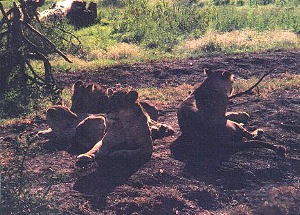
The game drives begin. The schedule was tight; arise at 5:45 am, tea at 6:15 am, game drive till breakfast at 8:45 am, lecture at 10:00 am, lecture at 11:30, lunch at 1:00 pm, game drive at 3:00 pm, next day's briefing at 7:15 pm, and dinner at 7:30. Local groups provided entertainment in the evening, dancing, singing and gymnastics. The days were full indeed, the sun shone and the hours of each day stretched long and joyful,
reminiscent of the discovery hours of childhood. This structured time pattern was to extend over the remainder of the trip. We were assigned a van and knowledgeable driver with whom we would stay for the duration of the adventure. Ours was named James and the others assigned to our van were two avid birders one of whom shouted out markings at any flick of the wing while the other thumbed through a very thick book looking for possible identifications. Another of our group was an orchestra conductor who was afraid of bugs and a doctor who'd worked in Haiti. Usually an assigned guide rode with us as well to assist in the answering of
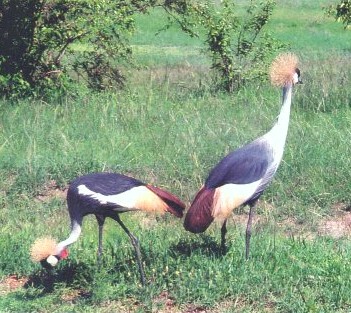 questions. We proved to be a congenial lot and a quick sighted one too. The prevalence of plains animals did not disappoint us. Through thickets, under umbrella acacias and scattered across tall-grassed plains we found them, buffalo, rhino, zebra, waterbuck, prides of lions and leopard, and birds, brilliant birds. Nakuru Lake itself is shallow. From a distance it seemed rimmed with pink
sand but as one drew nearer the pink turned into millions of flamingos, made into even more flamingos by reflection, and pelicans tucked in their oversized bills from their perches atop flat topped trees under which sleepy cape buffalo lounged chewing their cuds. The scene was perfect. But not all was as it seemed.
questions. We proved to be a congenial lot and a quick sighted one too. The prevalence of plains animals did not disappoint us. Through thickets, under umbrella acacias and scattered across tall-grassed plains we found them, buffalo, rhino, zebra, waterbuck, prides of lions and leopard, and birds, brilliant birds. Nakuru Lake itself is shallow. From a distance it seemed rimmed with pink
sand but as one drew nearer the pink turned into millions of flamingos, made into even more flamingos by reflection, and pelicans tucked in their oversized bills from their perches atop flat topped trees under which sleepy cape buffalo lounged chewing their cuds. The scene was perfect. But not all was as it seemed.
Before the British arrival a lucrative trade in ivory was well established. The numbers of elephants slaughtered were few however, since methods of killing were archaic. In 1906 a game department was established and hunting continued on game reserves for whites only. After 1945 changes were made in the game laws and National Parks and Game Reserves came into being, the former managed by the Federal Park service and the latter by the local Counties. In the beginning the National Park system was financed through the benefaction of foreigners, however as a result of some in-house political manipulating the system was believed to have become corrupt and foreign aid disappeared. This proved to be catastrophic. Due to uncontrollable poaching only one fifth of the elephant population survived and black rhino all but disappeared. In a country as poor and hungry as Kenya the temptation to poach can be overwhelming. A Rhino carries ten pounds of horn and in 1982 one pound of horn was worth 145,000 US dollars. At the present time dedicated park officials are encouraging the government to pay its game wardens a higher wage to discourage bribery, and also to embark on irrigation projects as an alternative method of survival for the native population who need food. At the same time peoples in the communities near the park should be allowed to benefit to a greater extent from tourism. At present only ten percent of monies realized through tourism are earmarked for conservation development. Poaching for money as well as sustenance remains an ongoing threat to this unique resource.
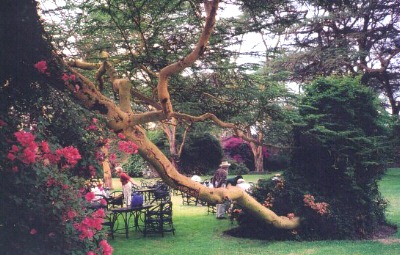 |
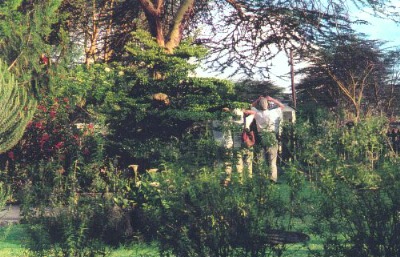 |
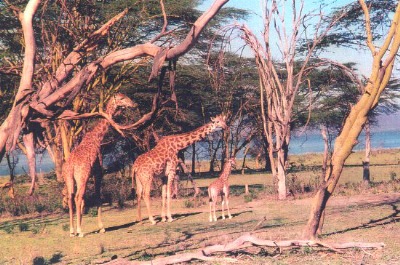
|
Our next sojourn was a game reserve set on the shore of beautiful Lake Naivasha, the highest of the Rift lakes. The British had built this country club as a tourist destination for aristocrats with enough money to be ferried in by float plane. Its original elegance was still obvious, gracious lawns set with black bamboo furniture around which impala grazed, arched arbour passageways to the pool, and signs warning to refrain from wandering along the paths to the lake after 7:00pm, at which time the buffalo would be feeding. The next day we were ferried by two-motor raft to a private game reserve on Crescent Island. Sections of Out Of Africa were filmed on location here. Here we could wander as we wished among the gazelles, zebra, waterbuck and wildebeests there being no aggressive animals lurking under the flat-topped Yellow-Fever trees. The ground spiders were huge. I asked about the annual July migration and was told that the wildebeests race around the circumference of the island at that time thinking that they are migrating. If it works, why not.
About this time the Americans in our group were getting edgy since the US election was now in full uproar and the Naivasha Country Club had a television that could receive CNN. We were surrounded by a covey of Democrats so there were few arguments, only condolences. Conversation at dinner however tended to wander toward US politics rather than the interesting social scene we were here to observe. We began to get a glimpse into the social structure of Kenya, one that surely must be changed in short order if the country is to survive. This lecture was given by a representative of the Outreach Centre at Edgerton University.
Social mores and the expectations that are hung on the backs of women seem to be crippling cultural progress though one hesitates to pass judgement on so short a visit. It was reported to us that women cannot own land or property though they are responsible for the running of the farm and the making of money in general, which must be handed over to 'her' man. Land is divided among the sons and the family home is passed to the youngest son who also inherits the care of aging parents. As a result in some areas farm holdings have become very small in size, sometimes no larger than the area of the lower floor of the standing house. At this point the animals live on the ground floor and human inhabitants live above. Even so, it is difficult to interest women in birth control methods in the face of a husband's opposition in this patriarchal system when they find themselves subservient and starving, in a culture where each female is expected to produce two girl and two boy children and one in which she is also expected to select the next in a series of wives. Sex before marriage is often condoned and the spread of HIV is epidemic. At present 25% of individuals between the ages of fifteen and forty nine are HIV positive. Condom promotion by government agencies has been attempted on all levels. Opposition however has been forthcoming from religious groups who fear that this action will contribute to what they call promiscuity. All things considered, infant mortality, Aids etc., the life expectancy of a Kenyan has dropped to thirty-five years from sixty-three.
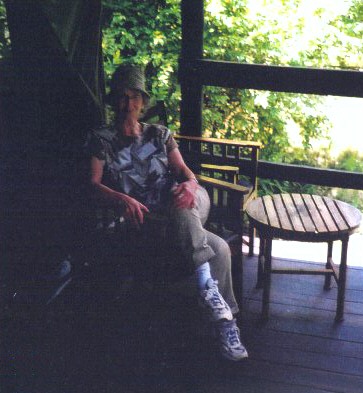 Our next location was a three-day stay in a tented safari lodge on the plains of the Masai Mara National Reserve. The Masai Mara, green and seemingly endless stretching into the Serengeti plains of Tanzania, gently undulating from horizon to horizon under a big-breath sky, like our prairies with tuckings of brush and whistling acacia and sausage trees, speckled with occasional water holes and the cones of termite nests. It was space. It was magnificent. And here and there off in the distance were groupings of creatures and sometimes a flash of red from the kanga cloth of a Maasai warrior tending his own herd of cows, staff in hand.
Our next location was a three-day stay in a tented safari lodge on the plains of the Masai Mara National Reserve. The Masai Mara, green and seemingly endless stretching into the Serengeti plains of Tanzania, gently undulating from horizon to horizon under a big-breath sky, like our prairies with tuckings of brush and whistling acacia and sausage trees, speckled with occasional water holes and the cones of termite nests. It was space. It was magnificent. And here and there off in the distance were groupings of creatures and sometimes a flash of red from the kanga cloth of a Maasai warrior tending his own herd of cows, staff in hand.
The game drives continued; sometimes two in one day and so did our introduction into the social structure and customs of the proud and beautiful Maasai people, the people who speak Maa.
The Maasai have lived in Kenya for four centuries and during that time customs have remained intact. Red clothing, many strings of jewelry, ear lobe stretching, ankle bracelets, the talking stick, the cow herding staff, all carry their own significance. They have few possessions thinking stored possessions a waste. Cows are their life and death currency. The blood and milk of cows still make up a large part of their diet. They believe that God gave them cows, all the cows in the world in fact, so the stealing of cattle is a natural right. The fertile plain also given by God on which to feed their cattle must also be protected, never scarred with tilling or well drilling. Once the Maasai controlled half of Kenya and fiercely protected their lands from slave traders. At the end of the nineteenth century however disaster struck and ninety percent of their cattle died and their owners became sick with smallpox brought by traders. When the British arrived they moved the few remaining Maasai to less productive land.
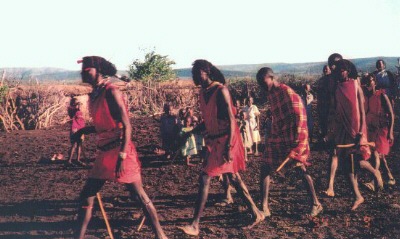
|
Tribal rights of passage are still observed. Small children have two lower teeth knocked out (this began when lock-jaw was prevalent) and circumcision of girls at thirteen to sixteen and boys at sixteen to eighteen is still practiced with the appropriate rituals. The boys must not show pain during the procedure and after which he lives with his parents for three months before retiring to the bush for a period of three and a half years with all the other boys in his age grouping who have also been circumcised. He will learn to hunt. He can now wear red and he is now a warrior.
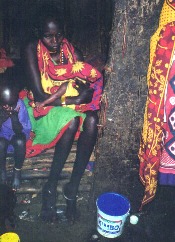 Marriages are arranged, often young girls marry older men who have the required number of cows for a bride price and perhaps a number of other wives as well. The bride is expected to become pregnant as soon as possible. She will fast during pregnancy so the baby will be small at birth and she will nurse for about three years. She is also responsible for building her own house. Houses in a Maasai compound are built of sticks and cow dung and take about three months to build. They are situated in a circle between two rows of brush fencing which is maintained by men. In the evening the cows are brought into the centre of the compound for safety from marauding predators. Each house is twelve feet square and windowless. Half of the house is used to house baby animals, small goats, chickens, etc. during the dangerous night hours. The other half houses the family, children sleeping on one side, adults on the other with a cooking hole in the floor in between. Compounds are built within carrying distance from water and are moved to new locations every four to six years.
Marriages are arranged, often young girls marry older men who have the required number of cows for a bride price and perhaps a number of other wives as well. The bride is expected to become pregnant as soon as possible. She will fast during pregnancy so the baby will be small at birth and she will nurse for about three years. She is also responsible for building her own house. Houses in a Maasai compound are built of sticks and cow dung and take about three months to build. They are situated in a circle between two rows of brush fencing which is maintained by men. In the evening the cows are brought into the centre of the compound for safety from marauding predators. Each house is twelve feet square and windowless. Half of the house is used to house baby animals, small goats, chickens, etc. during the dangerous night hours. The other half houses the family, children sleeping on one side, adults on the other with a cooking hole in the floor in between. Compounds are built within carrying distance from water and are moved to new locations every four to six years.
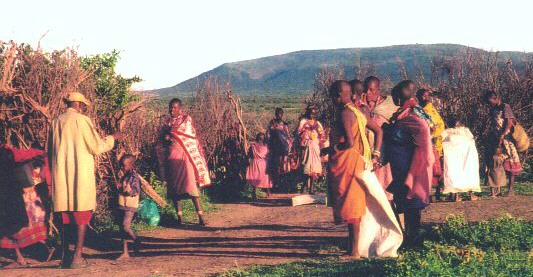 Mary, a slender Maasai woman, conducted us around her compound with much pride. She was a second in the order of six wives, and has eight children ranging in age from twenty four to four. She had been educated to the grade eight level which was unusual for a girl when the literacy rate for girls was ten percent thirty years ago. Even now the literacy rate in isolated tribes is low for both boys and girls. Boys often feel demeaned when subjected to female teachers at which time the tending of cattle becomes more alluring. Young red-cloaked Maasai warriors presented a dance for our benefit in the centre of the cow-trampled section of the compound . This consisted of much high jumping in accompaniment to deep-throated rhythmic grunting and marching. The small bare-footed boys gathered about in admiration. The barefooted girls stood dutifully beside their mothers. Mary introduced her husband who was tall and impressive and obviously rich in cows. He was attired in a tan coloured raincoat worn over his red Kanga, which is the latest fashion. He touched each child's head with affection as they wandered in and out of the compound while the warriors demonstrated the art of fire making using the gyrating stick method.
Mary, a slender Maasai woman, conducted us around her compound with much pride. She was a second in the order of six wives, and has eight children ranging in age from twenty four to four. She had been educated to the grade eight level which was unusual for a girl when the literacy rate for girls was ten percent thirty years ago. Even now the literacy rate in isolated tribes is low for both boys and girls. Boys often feel demeaned when subjected to female teachers at which time the tending of cattle becomes more alluring. Young red-cloaked Maasai warriors presented a dance for our benefit in the centre of the cow-trampled section of the compound . This consisted of much high jumping in accompaniment to deep-throated rhythmic grunting and marching. The small bare-footed boys gathered about in admiration. The barefooted girls stood dutifully beside their mothers. Mary introduced her husband who was tall and impressive and obviously rich in cows. He was attired in a tan coloured raincoat worn over his red Kanga, which is the latest fashion. He touched each child's head with affection as they wandered in and out of the compound while the warriors demonstrated the art of fire making using the gyrating stick method.
Our sojourn with the Elderhostel ended with a day back in Nairobi before our flights home. This gave us a chance to visit various museums, feed giraffes and peruse the local papers in more depth. There is no question that social and political problems are being discussed openly. The East African Standard ran an entire section on the evils of the child bride customs. Other papers reported cases of girls who refused to be circumcised taking their cases to court and winning. Occasionally a woman who receives no inheritance unlike her brothers can also win in the courts. There also is much rhetoric concerning the necessity for constitutional reform, the present constitution being negligent in the protection of the rights and freedoms of the individual. We also find outspoken criticism of what is called 'possessive individualism' which means graft, and press reports that the Maasai are being deliberately discouraged from cultural advancement by a government more interested in the pursuit of tourist dollars.
So we leave a rare and beautiful country. One plagued with problems, some expressed, some not. We leave knowing we had been lucky to have been allowed this very small glimpse into what lies there. Change is inevitable, the direction unpredictable though progress is possible with help and the leadership of dedicated individuals who dream the right dreams.